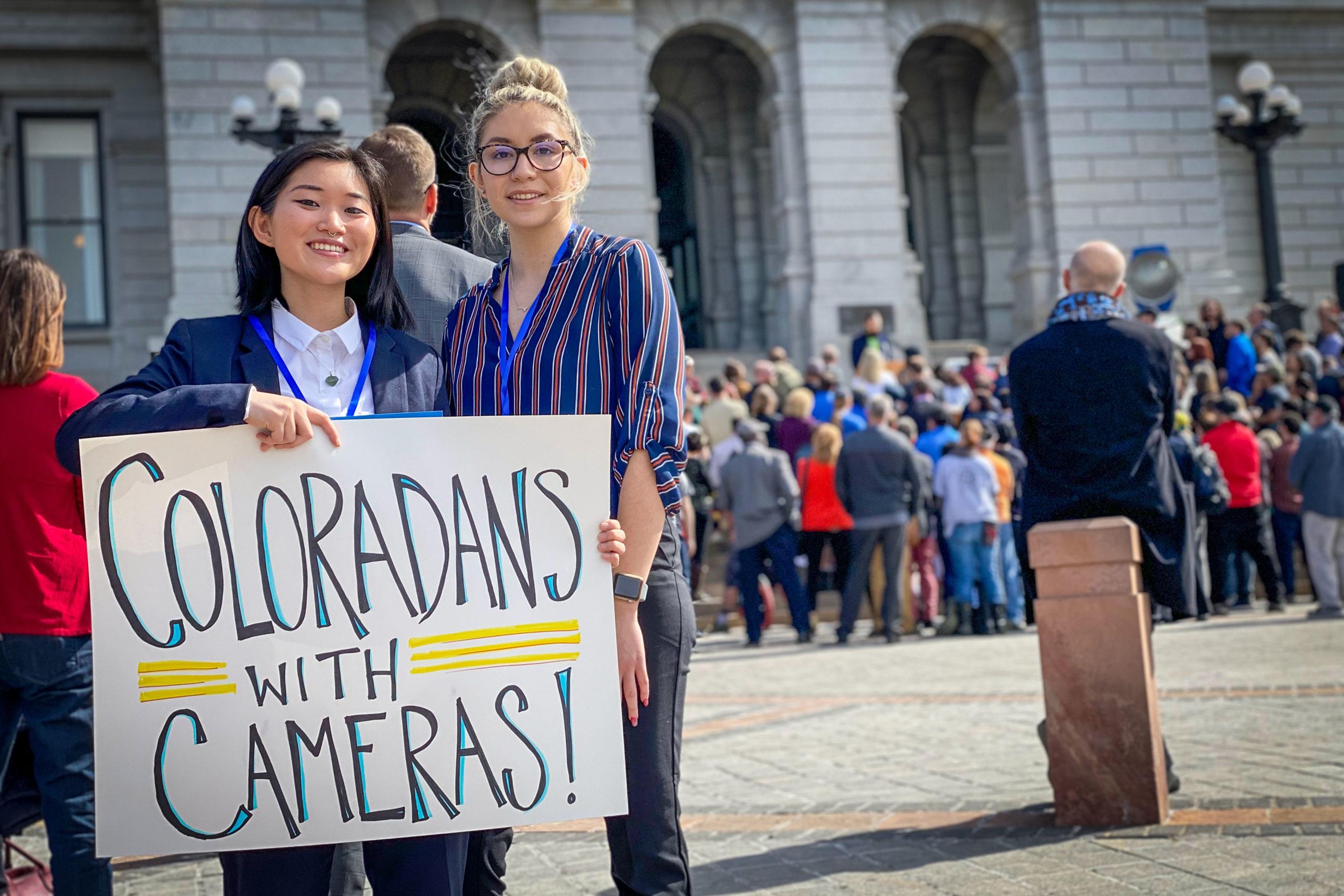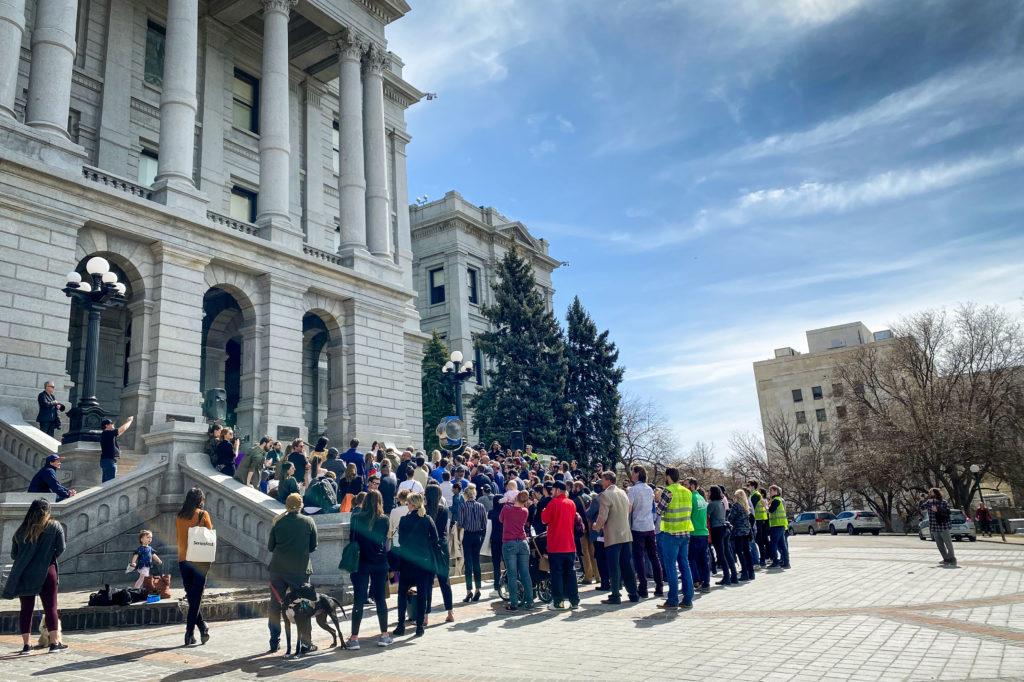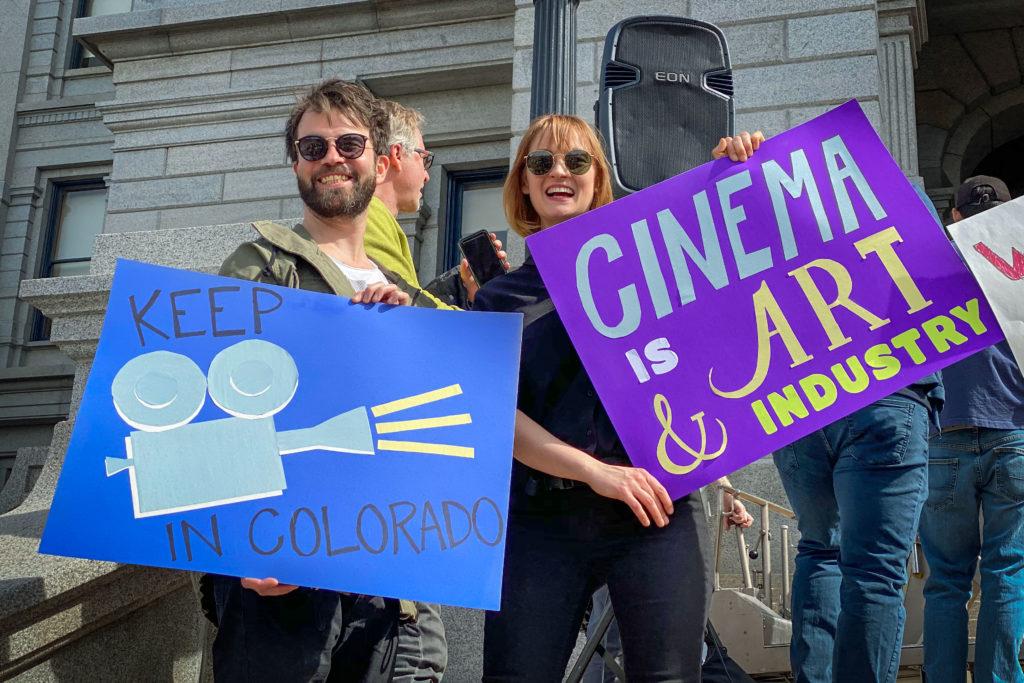
The film, television and video game industry rallied outside Colorado’s Capitol Friday. They were there to make their case to lawmakers, to plead for support in a new effort to incentivize the industry before it dwindles away.
The crowd chanted things like “We love film, sure we do, we love film, how bout you” and “you gotta fight for your right to make films.”
Marin Lepore is a film student at the University of Colorado Denver and runs Sad Girl Productions. She said there’s a lot of talent in the community and a strong local scene “that isn’t really being used” because there’s not enough opportunity in episodic and feature film work in Colorado.
"Being in school and being a student, a lot of my classmates, once we graduate, there's no opportunity here,” Lepore said. “So we have to move… and we’re just trying to get people to stay here and keep the talent here.”
She added that, if she could, she’d stay.
At the Friday rally, state Sen. Nancy Todd said she’s a “firm believer in the power of film.”

“Creativity and innovation is the Colorado way,” she told the crowd, adding that this is about having opportunities in the state for the students graduating from Colorado’s film schools. She then gave a call to action to the crowd to sit down with their state lawmakers and share their stories.
The backstory here is that many professionals in the local content creation industry fear they’re watching the death of their livelihoods within the state. Fewer major productions have come to Colorado as other states have expanded their film incentive programs. Neighboring New Mexico more than doubled its program from $50 million to $110 million and the industry has boomed in Georgia. The Peach State has no annual cap and offers higher percentages on rebates for production companies to recoup some expenses.
Colorado’s funding has varied over the last eight years, as high as $5 million one year and as low as $750,000, where it has remained. To qualify for the up to 20 percent rebates, productions have to prove they spent a certain amount and hired at least half of their crew from Colorado.
Many from the industry argue that’s not competitive enough, while critics of the incentives program have said there’s simply too much to financially back with state money, like education and roads. As major productions have followed incentives elsewhere, the motion picture and sound recording industry in Colorado has seen a decline in GDP. In-state infrastructure, like sound stages and supportive services, has diminished locally as well.
Some lawmakers are suggesting an alternative way to boost the industry.
A soon-to-be-introduced bill will propose transferable tax credits, enabling a media company to receive and then sell off tax credits when it owes less in state taxes than the credit is worth. A Colorado company can then purchase that credit for its own use.

Democratic state Rep. Leslie Herod received big applause when she announced to the crowd outside the capitol building Friday that she’s “sick of seeing films set in Colorado, but filmed in other states.”
Herod is a co-sponsor on the bill, along with Todd and state Rep. Daneya Esgar, who announced at the rally that she was adding her name to the bill after industry “voices swayed me to get involved.”
The bill would cap these transferable tax credits for the production industry at $5 million a year. The bill’s co-sponsors said the credits would be granted only in Taxpayer’s Bill of Rights refund years. Therefore, the $5 million capped transferable tax credits to the industry would reduce the amount of money that would go back to taxpayers through a TABOR refund, according to Henry Sobanet, chief financial officer of the Colorado State University System and former state budget director.
The latest Economic & Revenue Forecast from the Colorado Legislative Council Staff projects $142.4 million in sales tax refunds in the 2019-2020 fiscal year, currently forecasted at about $28 for a single filer making $41,000 or less a year — the tax credits would chip away at that amount. The next economic forecast for the state is expected out later in March.
The bill, if passed, could also come with administrative costs to the state as it would require someone to track these credits. It’s possible that it could be handled with existing resources, but that’s unclear until the bill is introduced. There are also questions on what happens for production companies that film in Colorado during non-TABOR refund years.

CU Denver student Monique Salas, who is exploring acting and producing, also attended the rally. She said that the jobs that could be created from a thriving industry could outweigh the reduced TABOR refund to taxpayers.
“You’re getting way more opportunities,” Salas said. “[The production companies] are buying stuff here locally, staying in our hotels, going to our restaurants. It’s putting money back into it more than what we’re giving them in the first place.”
The Leeds School of Business has calculated that every dollar spent by a production company could generate approximately $1.70 in the local economy.
Cinematographer and camera operator Kent Harvey came up in Colorado’s film industry, but now spends much of his time traveling to Georgia for his work. He said many films “shot in Georgia end with the Georgia peach” in their credits.
On top of other incentives, Georgia also offers a 10 percent “uplift” when productions include their logo on “approved projects.”
“Imagine that Colorado ‘C’ coming up at the end of every film,” he said. “It drives tourism, and restaurants and hotels benefit.”








